- Home
- Buy a Business
- Sell a Business
- Knowledge Center
Cavan Monaghan, Ontario
Haldimand, Ontario
Rural Woodlands County, Alberta
Chatham-Kent (Chatham), Ontario
Calling Lake, Alberta
Greater Napanee, Ontario
Thunder Bay Remote Area, Ontario
North Huron, Ontario
Wainfleet (Marshville/Winger), Ontario
Wollaston, Ontario
Mulmur, Ontario
Shelburne, Ontario
The average asking price for Gas Stations : $2,090,639 on FBFS.com
What are the most viewed Gas Stations listings on FBFS?

Buying a gas station in Canada offers a stable investment opportunity with consistent cash flow, though it requires substantial initial capital ranging from $250,000 to several million dollars. You'll need to evaluate key factors including location strategy, environmental regulations, and revenue diversification through convenience stores or fast-food operations.
While the business provides steady income due to Canada's high vehicle dependency, you'll face challenges like thin fuel margins, staffing issues, and evolving market trends with electric vehicles. Success depends on thorough location analysis, strong operational management, and strategic planning for multiple revenue streams. The following detailed examination will guide you through essential evaluations for your investment decision.
Read more
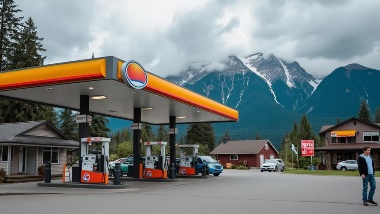
With consistent demand for fuel and convenience items, you'll find that gas stations provide reliable cash flow throughout economic cycles, making them particularly attractive for entrepreneurs seeking long-term stability.
Furthermore, when you purchase an established gas station, you benefit from a proven track record that mitigates the risks typically associated with startups.
When you analyze current market trends, you'll discover that Canadian gas stations are evolving beyond simple fuel dispensing locations into multi-service hubs. You're not just investing in a fuel station; you're acquiring a convenience store, potentially a car wash, and sometimes even a quick-service restaurant.
Additionally, Canada's steady population growth and expanding suburban communities continue to create new opportunities for gas station ownership. You'll benefit from the country's strong regulatory environment, which helps maintain fair competition and stable pricing structures.
With the ongoing shift toward electric vehicles, you're also positioning yourself to adapt and incorporate charging stations, ensuring your business remains relevant as automotive technologies advance.


While current market trends indicate strong potential for gas station ownership, you'll need to carefully evaluate various investment strategies to guarantee long-term success in this competitive industry.
| Aspect | Advantages | Disadvantages |
| Revenue | Consistent daily cash flow | Thin profit margins |
| Location | High-traffic opportunities | Property cost variations |
| Competition | Established customer base | Market saturation risks |
| Growth | Expansion possibilities | Environmental liabilities |

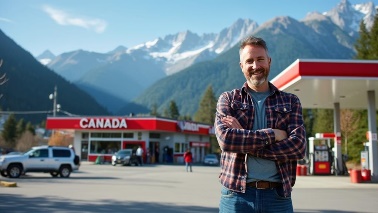
From the consistent demand for fuel that guarantees a reliable customer base to the potential for multiple revenue streams through convenience store operations, gas stations offer a robust business model that can withstand various economic conditions.
The opportunity to align with established franchise brands, combined with typically prime real estate locations, positions you to capitalize on both passing traffic and local community needs while building a sustainable, multi-faceted business.

Many Canadians rely heavily on their vehicles for daily transportation, creating a constant demand for fuel services. Recent consumer behaviour studies indicate that despite fluctuations in fuel prices and the gradual rise of electric vehicles, traditional gas stations continue to experience steady customer traffic.
Current market trends show that over 96% of vehicles in Canada still run on conventional fuel, ensuring a reliable customer base for your potential business venture.
In addition to this, understanding the acquisition preparation process can greatly enhance your chances of success in this competitive industry. You'll find that gas stations benefit from predictable consumption patterns, as most drivers maintain consistent fueling schedules based on their daily commutes and travel needs.
This steady demand isn't limited to urban centres—rural communities often demonstrate even stronger loyalty to local gas stations due to limited alternatives. Additionally, seasonal variations in travel patterns, such as summer road trips and winter holiday journeys, create reliable peak periods that you can anticipate and prepare for.
The essential nature of fuel services means you're investing in a business that's relatively resistant to economic downturns, as people continue to require transportation regardless of broader economic conditions.

Teaming up with a major franchise brand can greatly boost your gas station's success potential in Canada. When you align with established companies like Shell, Petro-Canada, or Esso, you'll gain immediate access to their proven business models and thorough support systems.
These franchise benefits extend far beyond simple brand recognition, encompassing operational guidelines, marketing resources, and supply chain efficiencies. Additionally, partnering with a franchise can provide you with financial benefits for small businesses, such as lower operational costs and exclusive savings opportunities.
Operating under a recognized brand name provides you with several competitive advantages in the Canadian market:
You'll receive extensive training and ongoing support to maintain operational excellence and meet brand standards.
You'll benefit from national advertising campaigns and promotional programs that drive customer traffic.
You'll have access to established supplier networks and bulk purchasing power.
The franchise structure also provides you with a blueprint for success, including detailed operating procedures and quality control measures.
While you'll need to follow corporate guidelines, you'll maintain significant autonomy in day-to-day operations. Additionally, most major brands offer territory protection, ensuring you won't face direct competition from other franchisees of the same brand within a specified radius of your location.


Situated in strategic locations across Canada's diverse landscape, prime real estate spots for gas stations can greatly impact your business's profitability and long-term success. Understanding the business purchase overview is vital as you evaluate potential acquisitions.
Through detailed location analysis, you'll discover that high-traffic intersections, major highway exits, and growing suburban areas consistently generate substantial customer flow, leading to increased fuel sales and convenience store revenue.
When evaluating potential locations, you'll need to consider both current market trends and future development plans in the area. Properties near commercial zones, residential developments, or industrial parks often provide steady business throughout the day, while locations along major transportation routes can capture both local and long-distance travelers.
You'll find that corner lots with multiple access points and good visibility from different directions tend to perform better than mid-block locations. Additionally, areas experiencing population growth or infrastructure development can offer excellent long-term appreciation potential for your property investment.

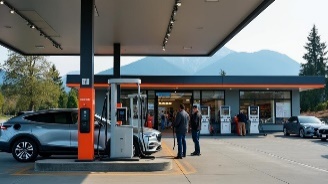
Your diversified revenue strategy can encompass multiple profit centers, from convenience store sales to ancillary services that meet various customer needs.
| Revenue Stream | Potential Benefits |
| Convenience Store | High-margin snacks, beverages, and everyday essentials |
| Car Wash Services | Recurring revenue with minimal staff requirements |
| Auto Repair Shop | Steady income from maintenance and repairs |
| Quick-Service Food | Additional foot traffic and increased customer spending |
| EV Charging Points | Growing market with government incentives |
When you're strategically planning your gas station business, you'll find that these multiple income streams help stabilize your cash flow during fuel price fluctuations. The beauty of this business model lies in its adaptability - you can start with basic services and gradually expand your offerings based on market demand and available capital. By implementing ancillary services such as ATMs, propane exchange, or lottery sales, you'll create additional touchpoints with customers while maximizing your property's earning potential.


With over 26,000 convenience stores across Canada, you can benefit from the extensive industry support and resources available to operators.
Through effective inventory management, you'll have the flexibility to stock products that cater to your local market's specific needs while maintaining ideal stock levels to maximize profitability. You can adjust your product mix seasonally and respond quickly to changing consumer preferences, ensuring your store remains competitive and relevant. This adaptability is essential, as the industry is increasingly focusing on sustainability and eco-friendly practices.
Superior customer service will set your convenience store apart from competitors and build a loyal customer base that returns not just for fuel, but for their daily necessities.
You'll have the opportunity to implement modern point-of-sale systems that track purchasing patterns and help you make data-driven decisions about product placement and pricing strategies.


Within many modern gas stations, adding a fast food component can greatly boost your revenue potential and customer traffic. By partnering with established fast food brands, you'll create an additional revenue stream while maximizing your property's operational efficiency.
The synergy between fuel services and quick-service dining has proven particularly successful in high-traffic locations across Canada. Additionally, leveraging the expertise of a business broker can help you identify the best fast food franchise opportunities that align with your gas station's vision and objectives.
When integrating a fast food operation into your gas station business, you'll benefit from:
Multiple revenue sources that complement each other, as fuel customers often purchase food and vice versa
Established brand recognition and marketing support from major fast food chains
Standardized operational procedures that streamline training and quality control
The integration of fast food services requires careful consideration of space utilization and staffing requirements.
You'll need to verify your location meets the specific requirements of potential fast food brands, including minimum square footage, ventilation systems, and kitchen equipment specifications.
Additionally, you'll need to factor in franchise fees, royalty payments, and ongoing operational costs when evaluating different quick-service restaurant options.

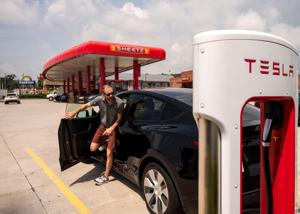
By investing in charging infrastructure, you'll position your business to capture a rapidly expanding customer segment while diversifying your revenue streams.
Market trends indicate that EV adoption rates in Canada are accelerating, particularly in urban areas and along major transportation corridors.
Installing EV charging stations can transform your location into a destination where drivers spend 20-40 minutes while their vehicles charge, creating additional opportunities for retail and food service sales.
You'll benefit from government incentives and programs designed to expand Canada's EV charging network, potentially offsetting a significant portion of your initial investment.
As the automotive industry continues its shift toward electrification, your gas station's early adoption of charging technology will establish you as a forward-thinking business owner while securing your position in the evolving transportation landscape.

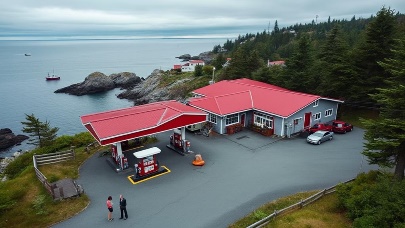
From the substantial initial investment often exceeding $1 million to the complexities of managing environmental regulations and staffing requirements, these obstacles require thorough evaluation before proceeding. Furthermore, you'll need to navigate the increasing shift toward electric vehicles and manage the constant fluctuations in fuel prices, which can directly affect your profit margins and long-term business viability.
| Challenge Category | Impact Level | Key Considerations |
| Financial | High | Initial investment, operating costs, profit margins |
| Operational | Medium | Staff turnover, inventory management, maintenance |
| Strategic | High | EV market growth, environmental compliance, competition |
You'll need to secure anywhere from $250,000 to several million dollars, depending on the location, size, and condition of the property.
The initial investment typically encompasses more than just the purchase price. You'll need to reflect on environmental testing costs, insurance premiums, inventory purchases, and working capital requirements.
Various financing options are available, including traditional bank loans and private lenders, but you'll need to demonstrate strong creditworthiness and likely provide a significant down payment, usually 15-30% of the total cost.


While the business can offer you independence and financial rewards, employee retention often becomes a persistent concern as you'll need to maintain a reliable workforce across multiple shifts, sometimes operating 24/7.
Implementing effective training programs requires substantial time and resources, particularly when dealing with high turnover rates common in the retail fuel industry.
Your success largely depends on overcoming these essential staffing obstacles:
Finding dependable employees willing to work irregular hours, including overnight shifts and holidays
Maintaining consistent quality of customer service despite frequent staff changes
Investing in ongoing training while balancing the risk of trained employees leaving for competitors
To mitigate these challenges, you'll need to develop thorough management strategies that include competitive compensation packages, clear advancement opportunities, and robust training systems.
Consider implementing automated processes where possible to reduce staffing requirements, though you'll still need to maintain adequate personnel for safety and customer service.


You'll need to navigate strict environmental regulations while maintaining thorough pollution management systems to protect both your business and the environment.
| Environmental Challenge | Required Action |
| Fuel Leaks & Spills | Regular tank inspections and immediate containment protocols |
| Soil Contamination | Annual soil testing and remediation if necessary |
| Groundwater Protection | Monitoring wells and quarterly water quality assessments |
The financial implications of environmental compliance can be substantial, as you'll need to maintain updated equipment, conduct regular inspections, and implement preventive measures. You'll be responsible for maintaining detailed records of all environmental assessments, spill reports, and remediation efforts, which provincial authorities may request during routine audits.
Additionally, you'll need to carry specialized environmental insurance coverage to protect against potential contamination claims, which can persist long after you've sold the business.
Conducting thorough due diligence before making purchasing decisions is essential to understand market conditions and supplier reliability.
You'll need to constantly monitor price volatility and adjust your pricing strategy to maintain competitive margins while ensuring sustainable returns. Market trends can shift rapidly due to global events, seasonal demands, and regional competition, requiring you to make quick decisions about when to purchase fuel and how to price it effectively.
Understanding the complexities of fuel pricing becomes vital as you'll face pressure from both upstream suppliers and price-conscious consumers. You'll need to develop strategies for managing your fuel inventory, including deciding when to buy in bulk during favorable price periods and how to maintain adequate supply during market uncertainties.
Additionally, you'll want to implement a robust system for tracking your competitors' prices while considering your operational costs to set ideal margins. Building relationships with reliable suppliers can help you negotiate better terms and potentially secure more stable pricing arrangements, though you'll still need to remain vigilant about market fluctuations and be prepared to adjust your strategy as conditions change.


To maintain competitiveness, you'll want to contemplate implementing charging infrastructure development at your location. While this requires substantial initial investment, government incentives and partnerships with charging network providers can help offset these costs.
Your market adaptation strategies should include diversifying revenue streams through enhanced convenience store offerings and additional services that cater to both traditional and EV customers.
Be aware that the shift to electric vehicles isn't happening uniformly across Canada. Urban areas are experiencing faster adoption rates than rural regions, which means your location will considerably influence how quickly you'll need to adapt.
You'll also want to monitor local demographic trends and provincial EV initiatives, as these factors will help determine the ideal timing for incorporating charging stations into your business model.

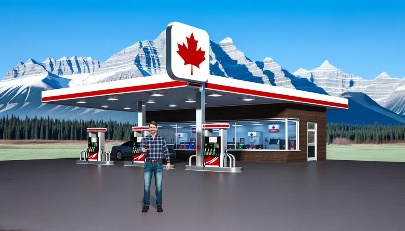
Investing in a Canadian gas station can be your gateway to financial independence, and coincidentally, the current market conditions make it an opportune time to enter this industry. As you've learned, while there are significant challenges like environmental regulations and high initial costs, the steady demand for fuel, combined with convenience store revenues, creates a resilient business model.
Your success will depend on thorough due diligence, strategic location selection, and effective operational management.

A: When buying an Esso gas station in Ontario, consider factors such as location, frontage, traffic flow, competition, and the condition of equipment. Also, evaluate the station's financial performance, potential for growth, and any additional revenue streams like a carwash or convenience store. It's essential to conduct a comprehensive market analysis and obtain market insights to make an informed decision.
A: To find gas stations for sale in Ontario, you can start by searching online listings, contacting commercial real estate agents specializing in gas station transactions, or reaching out to major oil companies like Esso. You can also browse gas station listings on business-for-sale websites, check local classifieds, or network with industry professionals to find potential opportunities.
A: To determine if a gas station is a prime investment opportunity, evaluate factors such as its strategic location, traffic patterns, and potential for growth. Look for well-established gas stations with excellent visibility and strong financial performance. Consider additional revenue streams like a carwash or convenience store. Analyze the 2024 projected revenue and conduct a comprehensive market analysis to ensure the investment aligns with your goals.
A: To find the right gas station for sale across Canada, start by defining your investment criteria, including location preferences, budget, and desired business model. Use online platforms to browse gas stations for sale in different provinces, from Ontario to Alberta. Work with commercial realtors specializing in gas station sales, and consider reaching out to major oil companies for franchise opportunities. Don't forget to evaluate each potential purchase based on its financial performance, location, and growth potential.
A: When buying an Esso gas station in Ontario, consider factors such as location, frontage, current and projected revenue, the condition of equipment including gas pumps, and whether it's a franchised gas station. Also, look into the property's commercial real estate value, potential for additional services like a carwash, and any existing power of sale situations.
A: A prime investment opportunity for a gas station in Canada typically includes factors such as a strategically located property with excellent visibility and high traffic, a well-established customer base, potential for additional revenue streams (e.g., convenience store, carwash, or liquor license), updated equipment, and strong financial performance with good 2024 projected revenue.
A: When browsing listings for a well-established gas station in Toronto, Ontario, look for details such as consistent financial performance, modern equipment (including fibreglass gas tanks), a loyal customer base, and additional revenue sources like a convenience store, liquor licenses or wash bays. Also, check if it's offered as a turnkey operation, which can make the transition easier for new owners.
The trademarks REALTOR®, REALTORS®, and the REALTOR® logo are controlled by The Canadian Real Estate Association (CREA) and identify real estate professionals who are members of CREA.
